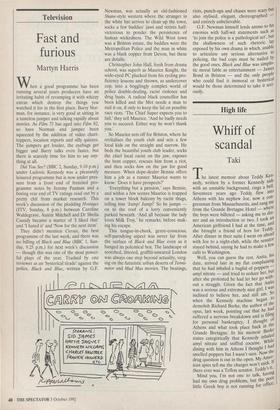Television
Fast and furious
Martyn Harris
When a good programme has been running several years producers have an irritating habit of revamping it with whizzy extras which destroy the things you watched it for in the first place. Barry Nor- man, for instance, is very good at sitting in a tasteless jumper and talking rapidly about movies. As Film 75 has aged into Film 92, so have Norman and jumper been squeezed by the addition of video chart- toppers, location reports and silly quizzes. The jumpers get louder, the eyebags get bigger and Barry talks even faster, but there is scarcely time for him to say any- thing at all.
Did You See? (BBC 2, Sunday, 9.10 p.m.) under Ludovic Kennedy was a pleasantly leisured programme but is now under pres- sure from a front end of frenzied pro- gramme notes by Jeremy Paxman and a boring rear end of TV ratings read out by a pretty chit from market research. This week's discussion of the plodding Hostages (ITV, Sunday, 8 p.m.) between Caroline Waldegrave, Austin Mitchell and Dr Sheila Cassidy became a matter of 'I liked that' and 'I hated it' and 'Now for the next item'.
They didn't mention Civvies, the best programme of the last week, and there was no billing of Black and Blue (BBC 1, Sun- day, 9.25 p.m.) for next week's discussion — though this was one of the most power- ful plays of the year. Trashed by one reviewer as an `hysterical tirade' against the police, Black and Blue, written by G.F. Newman, was actually an old-fashioned Shane-style western where the stranger in the white hat arrives to clean up the town, socks a few baddies' jaws and retires half- victorious to ponder the persistence of human wickedness. The Wild West town was a Brixton estate, the baddies were the Metropolitan Police and the man in white was a black copper from Devon, but these are details.
Christopher John Hall, fresh from drama school, was superb as Maurice Knight, the wide-eyed PC plucked from his cycling pro- ficiency lessons and thrown, as undercover cop, into a bogglingly complex world of police double-dealing, racist violence and drug busts. A radical black councillor has been killed and the Met needs a man to nail it on, if only to keep the lid on possible race riots. 'The Chief Super expects you to fail,' they tell Maurice. 'And he badly needs you to succeed. Either way he won't thank you.'
So Maurice sets off for Brixton, where he revitalises the youth club and sets a few local kids on the straight and narrow. He beds the beautiful youth club leader, socks the chief local racist on the jaw, exposes the bent copper, rescues him from a riot, and then socks him on the jaw for good measure. When dope-dealer Bennie offers him a job as a runner Maurice wants to know: 'Does it have prospects?'
`Everything but a pension,' says Bennie, and within a few scenes Maurice is trapped on a tower block balcony by racist thugs, telling him 'Jump! Jump!' So he jumps on to the roof of a lorry conveniently parked beneath. 'And all because the lady loves Milk Tray,' he remarks, before mak- ing his escape.
This tongue-in-cheek, genre-conscious, self-parodying aspect was never far from the surface of Black and Blue even as it banged its polemical box. The landscape of scorched, littered, graffiti-smeared London was always one step beyond actuality, verg- ing on the futuristic urban deserts of Termi- nator and Mad Max movies. The beatings,
riots, punch-ups and chases were scary but also stylised, elegant, choreographed — and entirely unbelievable.
G.F. Newman himself lends ammo to his enemies with half-wit statements such as `to join the police is a pathological act', but the shallowness of such rhetoric lay exposed by his own drama in which, unable to articulate any serious alternative to policing, the bad cops must be nailed by the good ones. Black and Blue was simplis- tic moral fable as entertainment — James Bond in Brixton — and the only people who could find it immoral or hysterical would be those determined to take it seri- ously.


















































 Previous page
Previous page